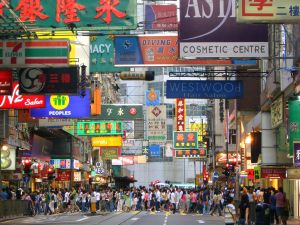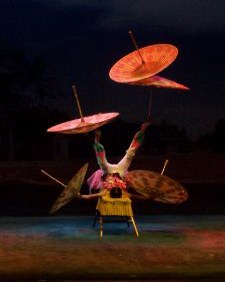China Part 2
Travel The World

In Beijing, on October 1, 1949, Mao Zedong proclaimed the founding of the People's Republic of China (P.R.C.). The new government assumed control of a people exhausted by two generations of war and social conflict, and an economy ravaged by high inflation and disrupted transportation links. A new political and economic order modeled on the Soviet example was quickly installed.
In the early 1950s, China undertook a massive economic and social reconstruction program. The new leaders gained popular support by curbing inflation, restoring the economy, and rebuilding many war-damaged industrial plants. The CCP's authority reached into almost every aspect of Chinese life. Party control was assured by large, politically loyal security and military forces; a government apparatus responsive to party direction; and the placement of party members into leadership positions in labor, women's, and other mass organizations.
The "Great Leap Forward" and the Sino-Soviet Split In 1958, Mao broke with the Soviet model and announced a new economic program, the "Great Leap Forward," aimed at rapidly raising industrial and agricultural production. Giant cooperatives (communes) were formed, and "backyard factories" dotted the Chinese landscape. The results were disastrous. Normal market mechanisms were disrupted, agricultural production fell behind, and China's people exhausted themselves producing what turned out to be shoddy, un-salable goods. Within a year, starvation appeared even in fertile agricultural areas. From 1960 to 1961, the combination of poor planning during the Great Leap Forward and bad weather resulted in one of the deadliest famines in human history.
The already strained Sino-Soviet relationship deteriorated sharply in 1959, when the Soviets started to restrict the flow of scientific and technological information to China. The dispute escalated, and the Soviets withdrew all of their personnel from China in August 1960. In 1960, the Soviets and the Chinese began to have disputes openly in international forums.

In the early 1960s, State President Liu Shaoqi and his protégé, Party General Secretary Deng Xiaoping, took over direction of the party and adopted pragmatic economic policies at odds with Mao's revolutionary vision. Dissatisfied with China's new direction and his own reduced authority, Party Chairman Mao launched a massive political attack on Liu, Deng, and other pragmatists in the spring of 1966.
The new movement, the "Great Proletarian Cultural Revolution," was unprecedented in communist history. For the first time, a section of the Chinese communist leadership sought to rally popular opposition against another leadership group. China was set on a course of political and social anarchy that lasted the better part of a decade. In the early stages of the Cultural Revolution,Mao and his "closest comrade in arms," National Defense Minister Lin Biao, charged Liu, Deng, and other top party leaders with dragging China back toward capitalism. Radical youth organizations, called Red Guards, attacked party and state organizations at all levels, seeking out leaders who would not bend to the radical wind. In reaction to this turmoil, some local People's Liberation Army (PLA) commanders and other officials maneuvered to outwardly back Mao and the radicals while actually taking steps to rein in local radical activity. Gradually, Red Guard and other radical activity subsided, and the Chinese political situation stabilized along complex factional lines.
The leadership conflict came to a head in September 1971, when Party Vice Chairman and Defense Minister Lin Biao reportedly tried to stage a coup against Mao; Lin Biao allegedly later died in a plane crash in Mongolia. In the aftermath of the Lin Biao incident, many officials criticized and dismissed during 1966-69 were reinstated. Chief among these was Deng Xiaoping, who reemerged in 1973 and was confirmed in 1975 in the concurrent posts of Politburo Standing Committee member, PLA Chief of Staff, and Vice Premier.
The ideological struggle between more pragmatic, veteran party officials and the radicals re-emerged with a vengeance in late 1975. Mao's wife, Jiang Qing, and three close Cultural Revolution associates (later dubbed the "Gang of Four") launched a media campaign against Deng. In January 1976, Premier Zhou Enlai, a popular political figure, died of cancer. On April 5, Beijing citizens staged a spontaneous demonstration in Tiananmen Square in Zhou's memory, with strong political overtones of support for Deng. The authorities forcibly suppressed the demonstration. Deng was blamed for the disorder and stripped of all official positions, although he retained his party membership.
Deng then led the effort to place government control in the hands of veteran party officials opposed to the radical excesses of the previous two decades. The new, pragmatic leadership emphasized economic development and renounced mass political movements. At the pivotal December 1978 Third Plenum (of the 11th Party Congress Central Committee), the leadership adopted economic reform policies aimed at expanding rural income and incentives, encouraging experiments in enterprise autonomy, reducing central planning, and attracting foreign direct investment into China. The plenum also decided to accelerate the pace of legal reform, culminating in the passage of several new legal codes by the National People's Congress in June 1979. After 1979, the Chinese leadership moved toward more pragmatic positions in almost all fields. The party encouraged artists, writers, and journalists to adopt more critical approaches, although open attacks on party authority were not permitted.
In late 1980, Mao's Cultural Revolution was officially proclaimed a catastrophe. Hua Guofeng, a protégé of Mao, was replaced as premier in 1980 by reformist Sichuan party chief Zhao Ziyang and as party General Secretary in 1981 by the even more reformist Communist Youth League chairman Hu Yaobang.
Reform policies brought great improvements in the standard of living, especially for urban workers and for farmers who took advantage of opportunities to diversify crops and establish village industries. Literature and the arts blossomed, and Chinese intellectuals established extensive links with scholars in other countries. At the same time, however, political dissent as well as social problems such as inflation, urban migration, and prostitution emerged. Although students and intellectuals urged greater reforms, some party elders increasingly questioned the pace and the ultimate goals of the reform program.
In December 1986, student demonstrators, taking advantage of the loosening political atmosphere, staged protests against the slow pace of reform, confirming party elders' fear that the current reform program was leading to social instability. Hu Yaobang, a protégé of Deng and a leading advocate of reform, was blamed for the protests and forced to resign as CCP General Secretary in January 1987. Premier Zhao Ziyang was made General Secretary and Li Peng, former Vice Premier and Minister of Electric Power and Water Conservancy, was made Premier.
1989 Student Movement and Tiananmen Square After Zhao became the party General Secretary, the economic and political reforms he had championed came under increasing attack. His proposal in May 1988 to accelerate price reform led to widespread popular complaints about rampant inflation and gave opponents of rapid reform the opening to call for greater centralization of economic controls and stricter prohibitions against Western influence. This precipitated a political debate, which grew more heated through the winter of 1988-89.
The death of Hu Yaobang on April 15, 1989, coupled with growing economic hardship caused by high inflation, provided the backdrop for a large-scale protest movement by students, intellectuals, and other parts of a disaffected urban population. University students and other citizens camped out in Beijing's Tiananmen Square to mourn Hu's death and to protest against those who would slow reform. Their protests, which grew despite government efforts to contain them, called for an end to official corruption and for defense of freedoms guaranteed by the Chinese constitution. Protests also spread to many other cities, including Shanghai, Chengdu, and Guangzhou.
Martial law was declared on May 20, 1989. Late on June 3 and early on the morning of June 4, military units were brought into Beijing. They used armed force to clear demonstrators from the streets. There are no official estimates of deaths in Beijing, but most observers believe that casualties numbered in the hundreds.
After June 4, while foreign governments expressed horror at the brutal suppression of the demonstrators, the central government eliminated remaining sources of organized opposition, detained large numbers of protesters, and required political reeducation not only for students but also for large numbers of party cadre and government officials.
Following the resurgence of conservatives in the aftermath of June 4, economic reform slowed until given new impetus by Deng Xiaoping's dramatic visit to southern China in early 1992. Deng's renewed push for a market-oriented economy received official sanction at the 14th Party Congress later in the year as a number of younger, reform-minded leaders began their rise to top positions. Deng and his supporters argued that managing the economy in a way that increased living standards should be China's primary policy objective, even if "capitalist" measures were adopted. Subsequent to the visit, the Communist Party Politburo publicly issued an endorsement of Deng's policies of economic openness. Though not completely eschewing political reform, China has consistently placed overwhelming priority on the opening of its economy.